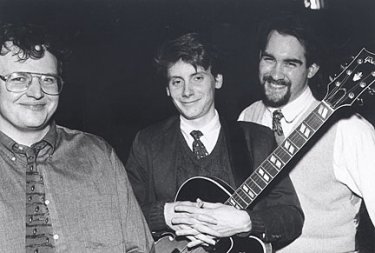
|
Craig Wagner |
Bio
Guitarist
Arranger
Conductor
Listen
Gallery
Fun Stuff
Contact
Originally published in the January, 1997 issue of the newsletter of the Cincinnati Jazz Guitar Society.
While this is probably the first time you've heard the name Craig Wagner, it's not likely to be the last. Wagner, a 25 year old resident of Louisville, Kentucky, is building a reputation as a strong guitarist with a unique sound.
 |
|
Craig Wagner (center) and the
Java Men |
Craig started playing guitar at age 14, and like so many jazz guitarists, he began by playing rock, but then became "bored and jaded" with rock music. He started playing jazz while attending Bellarmine College as a music major. After he received his degree in music from Bellarmine, he began playing "fingerstyle" guitar and writing compositions.
Last year, he placed second in the Winfield Kansas National Fingerstyle Guitar Championships, missing first by one point.
Wagner's band, The Java Men, has released one CD and will soon be releasing their second. Their sound is a unique twist on the classic organ trio format - organ, guitar, and drums. They play tightly arranged original compositions that vaguely resemble a combination of John Scofield, the Jimmy Smith-Wes Montgomery trio, the Flecktones and a faint echo of Yes. Java Men started as a "workshop" for the members, and after spending time doing tunes they felt they needed to work on, they eventually started doing only originals.
TB: How would you describe your band's sound?
CW: We've taken the basic organ trio format and used that as a spring point or a starting point and have incorporated a lot of more modern techniques in soloing and composition that you would not necessarily have ever heard in an organ trio format , especially compositionally.
We want to try to model ourselves after the great dynamic that all the great piano trios got like Bill Evans, even going back as far as Nat King Cole, going up to Chick Corea things with Gary Peacock and Jack DeJohnette. The kind of interplay they get is something we want to strive for in an organ trio format, to try to get away from the Chicken Shack cliches. Those are great and they weren't cliches when they were first played, but a lot of people don't go beyond that in the organ trio format. Now, I don't want to sound like I'm knocking all of that because that's so much of what I listen to, but there's other elements to be taken advantage of with this instrumentation.
TB: Did you ever study classical guitar?
CW: Just enough to annoy my teacher. I looked at a few classical pieces and worked my way through some of the Carcassi stuff, but at the time I was really into Johnny Smith and Pat Martino and George Benson, you know, killer plectrum guitar players. I was into the pick style.
About 3 years ago I was still playing just primarily picking stuff and making a lot of strides in that way. After that I got real frustrated going between the two. There were a lot of times when I would be soloing and there would be some more chordal kind of things, more intricate patterns that I would like to have played, and I couldn't really accomplish that with a pick. But then if I was playing fingerstyle, then I'd want to go to some fast single note line kind of thing that I would feel uncomfortable playing that fingerstyle. So I just eventually worked up a way where I use a thumbpick and I shave it down to where there's just enough of an edge to where I can use it as a flatpick and also in fingerstyle.
TB: Do you use your nails or fingerpicks?
CW: Yes, I have a bit of nails on all my fingers.
TB: And a flatpick on your thumb?
CW: Yes, but only when I'm doing a kind of tremolo thing am I using it as a flat pick. I mainly alternate between my thumb, middle and index finger. It's basically a 3 finger banjo roll that I do all my single note lines with. It's kind of weird.
TB: What does the future hold for you?
CW: I'd just like to be able to do what I'm doing now, except do it a lot more and for more money. (laughs) Right now, I'm teaching a lot, and I'm playing 6 nights a week at this club, but I'm not playing with Java Men. But we're playing jazz at this place and working Tuesday through Sunday. It really keeps your chops up working 5 sets every night.
TB: You get time in to practice on top of all the gigs?
CW: Yeah. I have time to practice before I go in to teach and then after the gig I usually come home and practice.
TB: There are different things that you learn in the practice room and on the gig. Could you talk a bit about the differences between those two?
CW: It's really hard to learn phrasing without playing every night live, going for that kind of phrasing that obscures any kind of bar line and implies all kind of different meters. Phrasing is one of those real intangible things to teach, and that's something that doesn't come together unless you're just playing all the time and having to think about different ways to play something. A lot of times we're playing with a singer there and how many things can you do with "They Can't Take That Away From Me", every night, night after night? You're just trying to think of new ways to approach the same tune, forcing yourself to do something different. That kind of pressure on the gig forces you to become a better player, and to explore things you wouldn't normally have done.
The creative aspect of it you can't really learn just from practicing improvising in your little room with your little Jamie Abersold play-along.
TB: I've always thought of music competitions as almost a self contradictory kind of thing. I've done competitions myself, but it's kind of a strange feeling to take something that's very personal to you and then say "Who does it better, me or you?"
CW: I basically did it [the national fingerstyle competition] as a challenge to myself. The real reason I was there was a personal reason - even though you have to do all this personal stuff in front of all those people. Glenn Gould said that the root of all evil wasn't money, it was competition. That has a distinct ring of truth. I wasn't competing against anyone there, I was competing against myself.
TB: Do you think of yourself as an artist or a musician?
CW: I don't see much of a difference. I'm definitely an artist if the truly realization of a musician is that - an artist. It's going beyond the mere knowledge of scales and chords, beyond the craftsman, artisan side of it and going into conveying emotions and emotive ideas through your music.
By the nature of what I'm into as a musician, composing, doing my own arrangements, the basic concepts of what I'm trying to get across, I would say it definitely falls under the line of art, although someone else may differ. I hope it is art. I think it is.
TB: Do you think hoping it's art and intending it to be art makes it art?
CW: I think intending it to be art shoots yourself in the foot. The stuff that I come up with, I would come up with whether I was playing all the time or not. I don't have any choice. It's not like I'm out there searching for it, it kind of finds me. You kind of throw your line out into the water and something finally tugs at it. You always want to be casting that line out there, but not with any preconceived notions that you might catch something. Sometimes an idea comes across your line that you wouldn't have come across had you been so caught up in "I have to create art today."
TB: When you're writing music, do you just sit down and say "I'm going to write some music".
CW: No. I don't think I've ever done that. It hits me at the weirdest times - in the car or in the shower. A certain melodic strain will shoot through your head and I have to jot that down or sing it out a little. I'll sing it out and try to write it down on some manuscript paper, or draw some lines on a napkin and draw out the melody and get to it later.
I look to groups like Ellington's band and Basie's band where a lot of the improvisation in that group was subordinated to the composition itself and the overall groove. We're very much an improvisational group, but we still try to find ways to nurture the composition too. It's difficult to find a good balance.
© 2002 - 2016, Tim Berens
All rights reserved